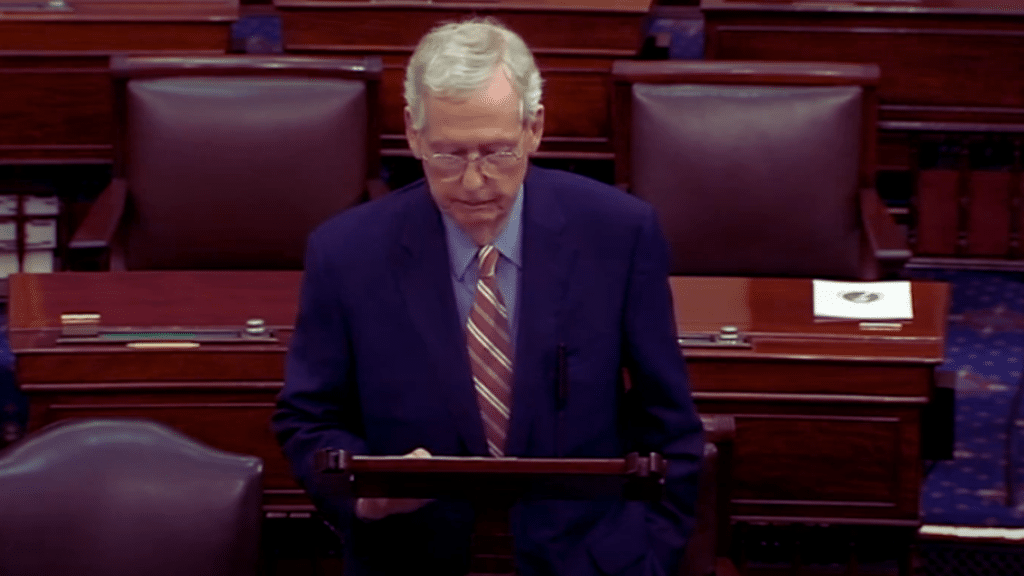Congress is once again at an impasse on funding the federal government with partial shutdowns looming in the next week, with no agreement between the House and Senate, or even between House and Senate Republicans, with Senate Minority Leader Mitch McConnell (R-Ky.) calling for “clean appropriations and away from poison pills” while House Speaker Mike Johnson (R-La.) pushing to “rein in Democrats’ overspending and policies” he says are harming America.
In a Senate floor speech on Feb. 26, McConnell urged that Congress simply pass a status quo funding package that will change almost nothing: “We have the means – and just enough time this week – to avoid a shutdown and to make serious headway on annual appropriations. But as always, the task at hand will require that everyone rows in the same direction: toward clean appropriations and away from poison pills.”
Translating from Swampese, “clean appropriations” means the status quo.
That had followed a Feb. 25 X (formerly Twitter) post by Speaker Johnson that outlined House Republicans’ position in favor of cutting spending and harmful regulations: “Our position is that of the American people and our mission is to take steps to rein in Democrats’ overspending and policies that are harming the economy, raising prices, and making everyday life harder for our constituents.”
As it is, funding deadlines now loom for March 1 for the Departments of Agriculture, Energy, Transportation, Housing and Urban Development and Veterans Affairs, and March 8 for Commerce, Defense, Education, Health and Human Services, Homeland Security, Interior, Justice, Labor, and State.
The House has proposed hundreds of policy riders in their appropriations bills that defund government censorship, diversity, equity and inclusion (DEI) and environmental, social and governance (ESG) policies, carbon disclosure rules and otherwise prioritize border security and stopping the flow of millions of illegal immigrants into the country.
From a policy perspective, having analyzed proposed government appropriations bills for over a decade, what House Republicans have come up with for Fiscal Year 2023 are among the most far-reaching and comprehensive approaches ever devised — and will surely serve as a roadmap for future Republican-led Congresses.
Whereas the Senate led by Majority Leader Chuck Schumer (D-N.Y.) doesn’t want any of those policies — and Senate Republicans led by McConnell apparently agree with him. That is, Senate Republican leaders don’t want a fight on any provisions whatsoever, effectively boxing House Republicans out since an effective strategy would in the minimum require Senate Republicans to make similar demands on the funding bills.
If you find yourself asking when Senate Republicans became so ineffective, a better question might be when they were ever highly effective at either cutting spending or reining in overreaching regulations. The only two large spending freeze of the past two decades were because Republican House Speakers John Boehner and Kevin McCarthy and their respective House majorities fought for budget sequestration in exchange for increases in the debt ceiling in 2011 and 2023, respectively. Senate Republicans voted in favor of both of those cuts, but the truth is, if they’d had their way, there wouldn’t have even been a fight.
There are very few pieces of must-pass legislation by which lawmakers can get anything accomplished. They are largely limited to appropriations and omnibus spending bills, continuing resolutions and debt ceiling increases. Lapses in appropriations can result in partial government shutdowns, whereas delays in debt ceiling authority can ultimately limit the federal government’s ability to borrow money for ongoing deficit expenditures.
Unfortunately, the choices being presented to the House and the American people are either doing nothing by passing another continuing resolution, which although it would maintain budget sequestration that automatically goes into effect April 30, doesn’t get anything else done to secure the border, cut spending further or roll back harmful regulations, or by passing the Senate’s so-called “clean” appropriations bills that similarly won’t cut more spending, secure the border or roll back regulations.
This sort of heads I win, tails you lose to appropriations is nothing new in Washington, D.C. and does outline the limits of what the GOP can hope to accomplish with just a small House majority. More might be accomplished, but that would require a united front from Senate Republicans, whose current leadership’s funding goals unfortunately for Republican and conservative voters appear to be more in line with the Senate Democratic majority than their own constituents.
Robert Romano is the Vice President of Public Policy at Americans for Limited Government.







